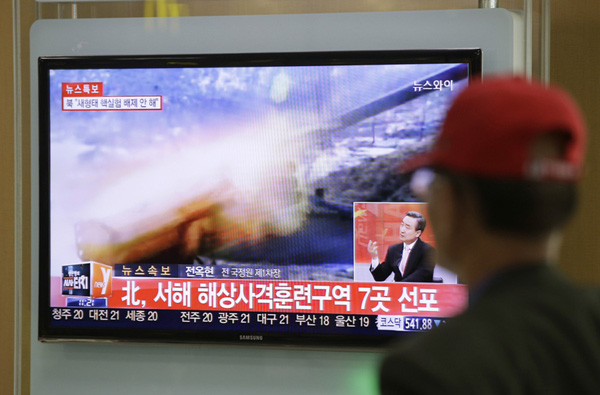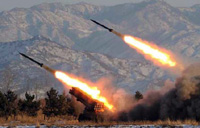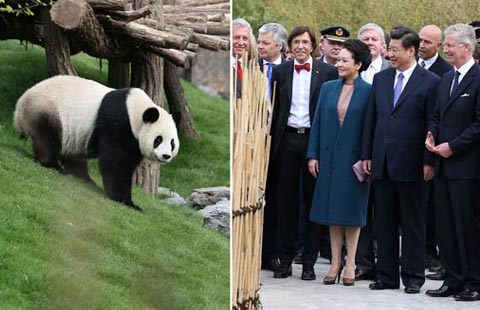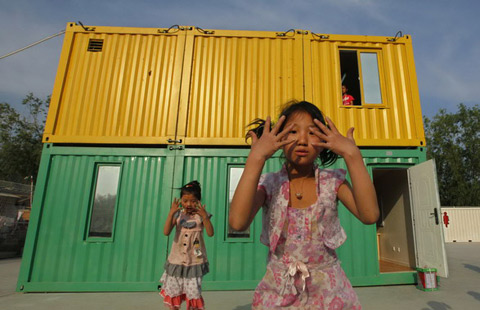China calls for calm on Korean Peninsula
Updated: 2014-04-01 07:22
(China Daily/Agencies)
|
||||||||
People watch a television news program reporting about DPRK's live-fire drills, at a Seoul train station in Seoul, the ROK, March 31, 2014. [Photo/icpress.cn]
China voices its concern over situation and calls for calm on Korean Peninsula

Pyongyang and Seoul traded fire over a disputed sea border on Monday, but Chinese analysts dismissed the possibility of a major military confrontation.
More than 100 shells out of about 500 fired landed in the Republic of Korea's waters as part of a drill, prompting ROK marines to fire more than 300 rounds into the Democratic People's Republic of Korea's waters, defense officials said in Seoul.
|
 DPRK fires 30 short-range rockets |
Pyongyang also accused Seoul of "gangsterlike" behavior at the weekend, following the "abduction" of one of its fishing boats, and threatened to retaliate. The ROK said it sent the boat back after it drifted into its waters.
China expressed concern over increased tension on the Korean Peninsula.
"We urge all parties to maintain calm, exercise restraint and refrain from acts going against peace and stability on the peninsula," Foreign Ministry spokesman Hong Lei said at a daily news briefing.
"The current situation on the peninsula is quite vulnerable, and safeguarding peace and stability conforms with the common interests of all parties," he said.
The DPRK had ensured maximum publicity for its live-fire drill by taking the unusual step of notifying the ROK beforehand and issuing a no-sail, no-fly advisory.
As a precaution, border island residents were evacuated as ROK fighter jets took to the skies.
Residents of Baengnyeong Island, one of the remote islands near the firing area, were moved to bomb shelters, a government official said. The evacuation order was lifted an hour after the DPRK drill ended.
Wang Junsheng, a researcher of East Asian studies at the Chinese Academy of Social Sciences, said Pyongyang's move may have been in response to several events.
The DPRK has staged a series of missile launches, mostly short range, in response to what it sees as a threat posed by annual US-ROK military drills. The current drill, Foal Eagle, ends on April 18.
"The shelling is an expression of the DPRK's dissatisfaction," Wang said. But Pyongyang's action has been rather restrained this time, he added.
Jia Xiudong, a senior researcher of international affairs at the China Institute of International Studies, said, "Pyongyang knows tension will not help it to break isolation by the international community."
At the same time, the ROK does not want the situation to get out of control, because increased tension is contrary to the peaceful progress initiative of ROK President Park Geun-hye, Jia said.
The White House said the DPRK's actions are dangerous and provocative and will further aggravate tensions in the region.
White House spokesman Jonathan Lalley said the US remains steadfast in its commitment to the defense of its allies and is working in close coordination with the ROK and Japan.
ROK Defense Ministry spokesman Kim Min-seok said the DPRK's action "is a planned provocation and an attempt to test our military's determination to defend the Northern Limit Line and to get an upper hand in South-North relations".
The Northern Limit Line, a maritime border that wraps itself round part of the DPRK's coastline, has been the scene of frequent clashes.
In 2010, four people were killed when the DPRK shelled the ROK island of Yeonpyeong. Earlier that year, a ROK naval vessel was sunk close to the line by what some countries said was a DPRK torpedo, although Pyongyang denies involvement.
Daniel Pinkston of the International Crisis Group said, "It's up to the two militaries either to recognize or reject their own claimed line and challenge the other's. This goes back and forth, so this is probably another episode."
The Northern Limit Line was drawn up at the end of the 1950-53 Korean War and the DPRK does not recognize it. The two sides are still technically at war, as the conflict ended in a truce, not a treaty.
Financial markets in the ROK were unmoved by the latest developments. The KOSPI index moved higher after early losses to finish the day up by 0.2 percent as the won extended gains to end onshore trade up by 0.4 percent against the US dollar.
Contact the writer at zhouwa@chinadaily.com.cn
- S Korea to maintain sanctions against DPRK
- ROK fires shells at DPRK waters after drills
- DPRK declares no-navigation zone in western border
- DPRK vows not to rule out new form of nuclear test
- DPRK lashes out at ROK 'gangsters'
- DPRK fires two ballistic missiles: media
- US should change approach to DPRK
- UN chief concerns over DPRK's missile launch
- DPRK fires 30 short-range rockets
- ROK sees DPRK's missile launch as armed protest

 Cherry blossoms in full bloom in Tokyo
Cherry blossoms in full bloom in Tokyo
 US-South Korea joint landing exercises in Pohang
US-South Korea joint landing exercises in Pohang
 World's tallest ferris wheel opens in Las Vegas
World's tallest ferris wheel opens in Las Vegas
 Did we get ya? Happy April Fools' Day!
Did we get ya? Happy April Fools' Day!
 Meet the crew of the drama of Green Snake
Meet the crew of the drama of Green Snake
 Students compete in Chinese competency
Students compete in Chinese competency
 Chinese, Belgian heads of state launch panda house
Chinese, Belgian heads of state launch panda house
 New British royal family photo released
New British royal family photo released
Most Viewed
Editor's Picks

|

|

|

|

|

|
Today's Top News
We should join hands,
Xi tells EU
Unidentified drone falls in ROK island
Japan approves new arms export rules
China refusing intl arbitration on S. China Sea issue
Last words from cockpit: 'Goodnight Malaysian 370'
DPRK, ROK exchange artillery fire
Families express gratitude for all involved in search
Malaysia vows not to give up till MH370 mystery solved
US Weekly

|

|







